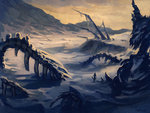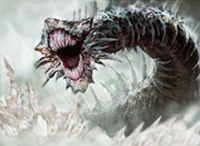
|
The Jedi were real? This article is part of the history of Clan Plagueis and isn't part of current events.
Please do not remove this tag or the contents. These articles exist for historic purposes.
|

|
| Boneyard of the Wyrms
|
|
Frozen Ocean
|
- Boneyard: 48 km
- Tunnels: Est. 250 km
|
|
Extreme Cold
|
- Snow drifts
- Ice shelves
- Wyrm bones
- Ice tunnels
|
|
Wyrms
|
|
|
|
House Plagueis
|
Located on Morroth, furthest planet from the star Sigil in the Jusadih System, the Boneyard of the Wyrms is the communal dying ground of its namesake, the dreaded Wyrms of Morroth. Located near the Mekduaa Valley on the Frozen Ocean, this is a place of powerful Dark Side auras and twisted majesty as titanic skeletons and corpses create a sort of macabre labyrinth. Beneath it all lie gigantic Wyrm-carved tunnels, made bigger with each passing Wyrm and used to cross over from the Great Tundra without being exposed to the harsher winds on the Ocean. From time to time, Dark Jedi come here to meditate, build lightsabers, or even take on the oldest and most deadly of the legendary beasts; few, if any, have ever lived to tell the tale.
History
Though the majority of life grown at the Temple of Plagueis stayed within its boundaries, the Wyrms, like the Mekduaa, received permanent field tests; though their majority were still in the tiny larval stage inside of the Temple, some examples of their largest and most-fearsome bulk could be found outside, in the snows of the Great Tundra. They were a powerful, durable species - capable of living off of minerals and other frozen components below the ices they tunneled through and capable of hibernating for months on end below the ice if necessary. Eventually, however, the greatest of them began to die.
It was in this time that the Sith at the Temple observed an odd behavior as they tracked the Wyrm; instead of simply laying down to die, the beast burrowed through the ice, making a pilgrimage of sorts to the Frozen Ocean. Once there, it burst free, howling out to the wind before finally giving in and dying. It was a trend repeated again and again, until finally an entire field of bones could be seen. The trend has continued, and to this day raises questions about the migration patterns, instincts, and possible intelligence of the monolithic Sithspawn.
Areas
Upper Boneyard
 Wyrms, the deadliest of Morroth's predators.
Wyrms, the deadliest of Morroth's predators.Comprised of smaller skeletons, such as those Wyrms who grew sick or were mortally wounded in battle, this area is still quite a sight; an entire company of Plagueian soldiers once made camp in the decaying carcass of a smaller Wyrm here. The area twists and bends, providing an acrobatic Dark Jedi with a good place to train or meditate, should they be brave enough. In addition, many try to use it as a hiding spot - they often die there in the belly of a Wyrm.
Lower Boneyard
Here, beneath smaller skeletons, the bones of the true Great Wyrms can be found; skeletons inside of which smaller Wyrms could comfortably live. In places, this part of the Boneyard is open to the elements. In others, bony caverns and tunnels catacomb throughout, giving host to Koth'ata, Wurrumps, infantile Wyrms and other small Morroth predators. Evidence shows that at times, colonists have tried to live here; their remains are typically found with the equipment left behind. It is a palpable area of Dark Side energy.
Ice Tunnels
Forged by the Wyrms over thousands of years, these tunnels are huge yet sturdy, criss-crossing under much of the Frozen Ocean; their recent discovery solves decades of puzzlement as to why sensor scans found huge, empty areas below the ice. Wyrms use these to travel to and from the Great Tundra, though they are also a haven for smaller Wyrms, including those as small as ten feet long. While not as invincible and overwhelmingly powerful as their elders, these tiny Wyrms are lightning fast and quite vicious, but are only one part of the danger here; the tunnels are considerably warmer than the air above, while still freezing, and thus attract their own scavenger-predator ecosystem of the planet's native creatures. It has recently been discovered that this inner ecosystem is actually the reason that adult Wyrms give birth here - their children live for decades in the expansive Tunnels until large enough to explore the Tundra, only returning afterward to give birth or die.
Voyage of the Wyrm
The Wyrm of Morroth is a peculiar beast, being born in clutches of five to seven live offspring that are interconnected in a fleshy pod; for the first six weeks of life, this pod protects them, while one or two offspring will murder their siblings and consume the pod. Typically, afterward, the stronger devours the weaker - it is theorized the Sith engineered them this way to ensure stronger broods - but survival of multiple offspring is a possibility. Afterward, they will live in the Ice Tunnels below the Frozen Ocean for as many as four decades, fighting other juveniles and hunting the creatures inherent there. They are not always the predator; at times, Wurrumps or Koth'ata - or, rarely, both at once- will team up to put down a juvenile or eat a slain juvenile carcass. The fight is often deadly for them, but the meat lasts for multiple months in the frozen climes of Morroth - nothing exists that can decay or rot the frozen meat in time.
After their juvenile period is over, the young Wyrm will venture out into the Great Tundra from time to time, seeking nutrition or other Wyrms to spar with or mate with. Female Wyrms are particularly aggressive, and are known to be less vulnerable when with child; they secrete a resin under the top layer of skin that hardens into extra protection. Male Wyrms, more focused on hunting, will rove about looking for prey animals or deposits of mineral nutrient beneath the ice. Often, others are the prey.
 A lightsaber hilt constructed with Wyrm ivory.
A lightsaber hilt constructed with Wyrm ivory.Female Wyrms will mate with multiple males and give birth to multiple clutches, though all fight for the privilege; after this, they protect her as she journeys to the Ice Tunnels, giving birth in different areas to give her offspring a chance. They are abandoned instantly; as if in another nod to Sith theology, if they need help, the mother considers them undeserving. After birthing, the males depart as quickly as possible, given that the female will typically take a bite out of one or two of them to feed herself. Wyrms that do not make it to the Boneyard are consumed entirely, either by other Wyrms or a host of other predators; not even bones are left behind.
Upon aging to their limit, or upon being mortally wounded or crippled, a Wyrm makes a voyage for the Boneyard. Typically, they join up with others, though they are not aggressive at this time. They howl during the entire journey, a shrill, reverberating sound that keeps away all predators smaller than them and, remarkably, causes other Wyrms to back down. Should a Wyrm die before the journey is complete, they are eaten by the healthy; those who make it to the Boneyard stretch out across its bulk, howl out mysterious and frightening songs, and eventually give in to death. It is known that every Wyrm song is unique, though far from beautiful; the sound is used by mining towns on Morroth at a much lower volume to scare off smaller predators.
It has been noted that the Dark Side aura around the Boneyard accumulates with each death; after four or five new Wyrms, it has been felt as remarkably stronger. It is theorized that, should the trend continue, one day it will warp the minds and even the bodies of any in its vicinity.
Importance to Plagueis
The Boneyard of the Wyrms is used primarily by Plagueis as a training ground or meditative site, though it is used sparingly; on rare occasions, foolish Journeymen will lead soldiers and allies in to protect them. Should they survive, their assistants usually do not, and they are summarily punished. Most notably, it is used by Jedi Hunters as a site to construct lightsabers, given that its dark auras help enhance their senses and can even lend a vile guidance to the creation of a killing tool.
Outside of this, it is also a goldmine for Jusadih biologists; ice tunnel expeditions can yield many samples of the fauna of Morroth, while samples of Wyrm biology and their frozen rib bones, nicknamed "Wyrm ivory", are invaluable both to science and economic interests. Though harvesting it is lethal beyond imagining, some craftsmen will occasionally leave with a freighter full of the bone matter; the Dark Side effect on some of the larger bones sampled has been shown to intensify anger and even cause crimes of passion, and thus, the sale of Wyrm ivory is heavily regulated by the JMR under the guise of "poaching prevention".
Trivia
- Wyrms were originally dragon-like quadrupeds with a primitive culture; given the impossibility of this, the concept was adjusted to its current form.
- The Boneyard of the Wyrms is one of Morroth's oldest landmarks, and is one of the few intact since the formation of Plagueis.
- The only instance of a Wyrm not killed by another, yet not dying at the Boneyard, was during a House Satal Keto Run-On.
- It was also the only instance so far of a Dark Jedi riding a Wyrm - Mograine used the power Beast Control to tame the creature following its destruction of his platoon's speeder bikes.
- Article created by Kal di Plagia Vorrac at the request of QUA Tra'an Reith. Modern Wyrms created by Furios.